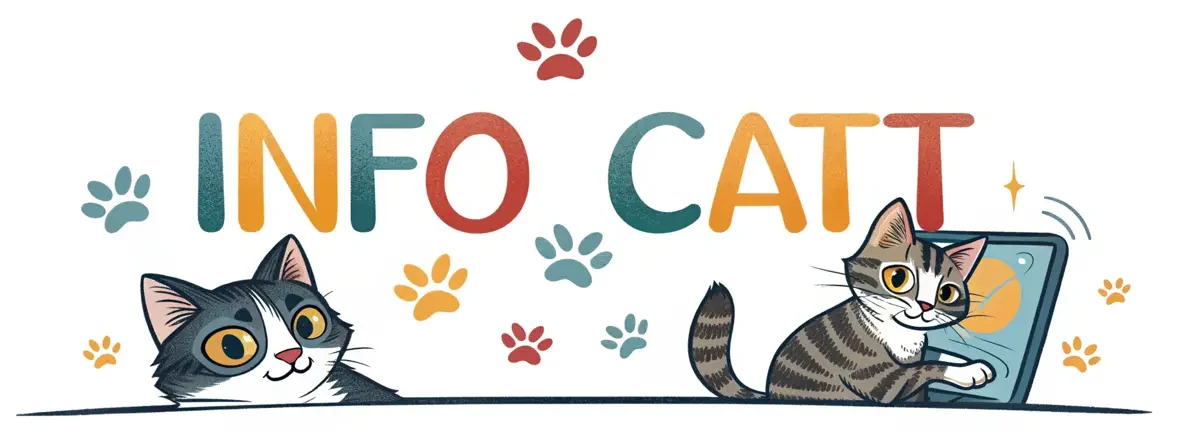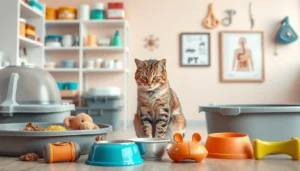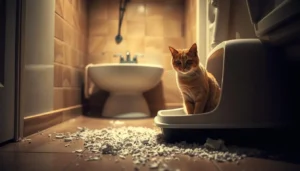Every cat parent knows that moment of panic when your furry friend hasn’t used the litter box for days. The worry sets in quickly: why is my cat not pooping? Cat pooping problems can be distressing, leaving you feeling helpless and concerned about your pet’s health.
Watching your normally active and playful cat struggle with bathroom issues is heart-wrenching. Whether it’s a sudden change in routine or a persistent problem, understanding the underlying causes can help you take the right steps to support your feline companion’s digestive health.
This guide will walk you through everything you need to know about cat pooping problems. From identifying normal bathroom habits to recognizing serious warning signs, we’ll help you navigate this challenging situation with confidence and care.
Understanding Normal Cat Pooping Habits
Every cat owner wants their pet to have healthy bathroom habits. Knowing how often cats poop and what’s normal can help spot health problems early.
Typical Pooping Frequency for Cats
Vets say healthy adult cats poop once to twice a day. Kittens and older cats might poop more or less:
- Kittens: May poop up to 3-4 times per day
- Adult cats: 1-2 times daily is normal
- Senior cats: Might poop less frequently
Characteristics of Healthy Cat Poop
Knowing what healthy cat poop looks like is key. Ideal cat poop should have these traits:
- Color: Medium to dark brown
- Consistency: Firm but not hard, similar to play-doh
- Shape: Well-formed and log-like
Normal Bathroom Behavior Signals
If your cat won’t use the litter box, it could mean a problem. Look for these signs of normal bathroom behavior:
- Consistent litter box use
- No straining during defecation
- No blood or mucus in stool
- Regular, predictable bathroom routine
Always monitor your cat’s bathroom habits and consult a veterinarian if you notice significant changes.
Why Is My Cat Not Pooping: Common Causes and Signs
Knowing why your cat might not poop can help solve the problem fast. If your cat hasn’t pooped in days, it’s important to find out why. This can help fix their digestive issues.
Several key factors can cause your cat’s pooping problems:
- Dietary Issues: Low-fiber diets or sudden changes in food can trigger constipation
- Dehydration, which makes stool harder and more difficult to pass
- Lack of physical activity reducing intestinal motility
- Stress or significant environmental changes
Medical conditions can also stop your cat from pooping normally. Possible causes of feline constipation include:
- Hairballs blocking the digestive tract
- Intestinal blockages from ingested foreign objects
- Neurological disorders affecting bowel movements
- Chronic diseases like kidney problems or diabetes
If your cat hasn’t pooped in days, look out for other signs. These include:
- Straining in the litter box
- Decreased appetite
- Visible discomfort
- Reduced energy levels
Early detection and understanding of these causes can prevent more serious health complications for your feline friend.
Symptoms of Cat Constipation You Shouldn’t Ignore
Spotting cat constipation symptoms early can help your cat avoid a lot of pain. Cats are experts at hiding their health problems. So, it’s key to pay close attention to their bathroom habits.
When your cat has digestive issues, there are clear signs to look out for. Seeing your cat strain but not poop is a big red flag. It means something might be off with their digestive system.
Physical Signs of Constipation
Look out for these physical signs that might mean your cat is constipated:
- Visible discomfort during litter box visits
- Hard, dry stools
- Reduced frequency of bowel movements
- Small, pebble-like droppings
- Swollen or tender abdomen
Behavioral Changes to Watch For
Cats show their feelings through how they act. Some changes can mean they’re having digestive trouble:
- Frequent trips to the litter box with no results
- Vocalization or meowing while attempting to defecate
- Decreased appetite
- Lethargy or reduced activity levels
- Excessive grooming of the rear area
Warning Signs That Require Immediate Attention
Some symptoms of cat constipation need you to call the vet right away. If you see any of these, get in touch with your vet fast:
- No bowel movement for more than 48-72 hours
- Persistent vomiting
- Significant weight loss
- Blood in stool
- Extreme lethargy or weakness
Early detection can stop serious health problems for your pet.
If you’re also concerned about other unusual behaviors, you might want to check out why your cat may be breathing fast and what it could mean for their health.
Natural Remedies and Home Solutions for Constipated Cats
Dealing with a constipated cat can be stressful for pet owners. Luckily, there are many home remedies for cat constipation. These can help your furry friend feel better. Knowing how to help starts with simple, effective solutions you can do at home.
Diet is very important for managing cat constipation. Here are some dietary changes to support your cat’s digestive health:
- Add canned pumpkin to your cat’s diet (1-2 teaspoons)
- Increase moisture intake with wet food
- Introduce fiber-rich supplements
- Ensure fresh water is always available
Gentle physical interventions can also help. Try these home techniques to ease your cat’s discomfort:
- Massage your cat’s abdomen gently
- Encourage light exercise and movement
- Use warm compresses on the belly
Hydration is crucial for addressing cat constipation. To encourage more water intake, try:
- Water fountains
- Multiple water bowls around the house
- Bone broth as a tasty liquid supplement
Remember, while these home remedies can help, persistent constipation requires veterinary attention.
When to Seek Veterinary Care for Your Cat’s Pooping Problems
Knowing when to take your cat to the vet for constipation is key. Not all digestive problems are small. Some need quick vet help.
It’s important to know when to get vet help for your cat’s stomach issues. Some symptoms mean you need to act fast.
👉 Emergency Symptoms to Watch For
Look out for these signs that mean you should call your vet right away:
- No bowel movement for more than 48-72 hours
- Straining in the litter box with no results
- Visible pain or discomfort while attempting to poop
- Blood in stool or around the rectal area
- Significant weight loss
- Vomiting accompanying constipation
👉 Treatment Options Your Vet May Recommend
When you take your cat to the vet for constipation, they might suggest:
- Diagnostic tests to find the cause
- Medicines to help bowel movements
- Changing their diet
- Drinking more water
- Removing stuck stool
👉 Prevention Tips From Veterinary Experts
Vets say to take steps to avoid constipation in the future:
- Keep them hydrated
- Feed a high-fiber diet
- Make sure they exercise
- Reduce stress
- Go for regular vet visits
Always trust professional veterinary guidance when managing your cat’s digestive health.
Conclusion
Cat pooping problems can be upsetting for both you and your cat. It’s important to know why your cat isn’t pooping to keep them healthy. We’ve looked at many reasons, from food issues to health problems that might affect their bathroom habits.
Watching your cat’s bathroom habits closely is key. If your cat has ongoing pooping issues, act fast. Early action can stop bigger health problems. Every cat is different, so watch for changes in your cat’s behavior and symptoms.
Your vet is a great resource for these issues. They can find the cause and suggest the right treatment. This could be changing their diet, making sure they drink enough water, or even medical treatment.
Be proactive and caring. Knowing your cat’s health needs and getting medical help when needed is crucial. Regular vet visits, a good diet, and careful care can help avoid and manage pooping problems in cats.
FAQ
How often should a healthy cat poop?
Healthy cats usually poop once or twice a day. If your cat poops less or has trouble, it might be sick.
What are the main signs of cat constipation?
Signs include straining, hard stools, and less poop. Your cat might also be tired or show belly pain.
What can cause my cat to become constipated?
Causes include dehydration, bad diet, hairballs, and stress. Medical issues and some meds can also cause it.
How can I help my settled cat at home?
Increase water, add canned pumpkin, and use fibre. Make sure they exercise and have a clean litter box. Belly massages can also help.
When should I take my cat to the vet for constipation?
Go to the vet if your cat hasn’t pooped in 48-72 hours. Look for vomiting, weight loss, lethargy, or hard straining.
Can diet changes help prevent cat constipation?
Yes! Feed high-moisture food, add fiber, and give fresh water. A regular diet helps. Talk to your vet about what’s best for your cat.
Is cat constipation dangerous?
Untreated constipation can cause serious problems like impaction and megacolon. It can also harm the colon. So, treat it quickly.
Can stress cause cat constipation?
Yes, stress affects cats’ digestion. Changes, new pets, or moving can cause anxiety and constipation. Keep things calm and consistent.



